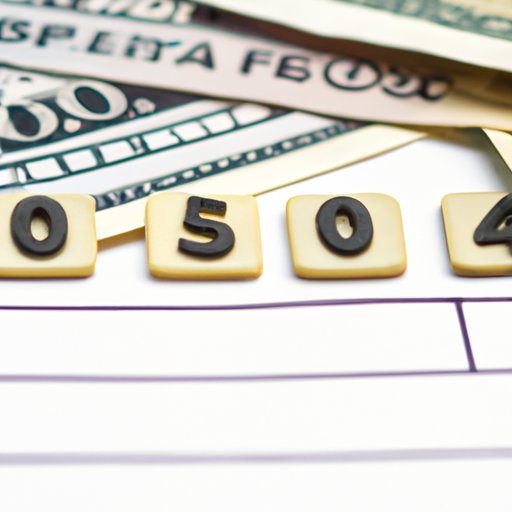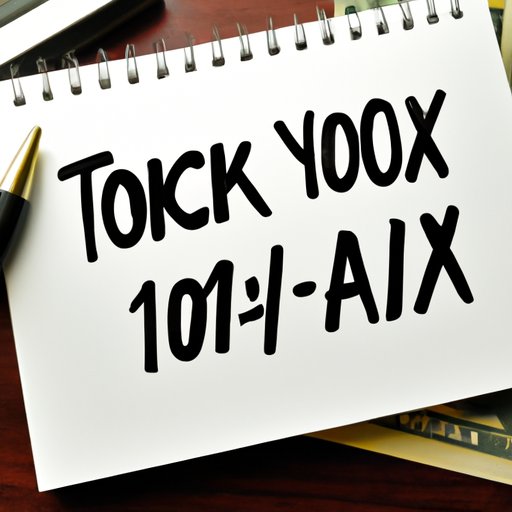
Introduction
When faced with a financial emergency or a sudden need for cash, many people consider cashing out their 401k. While the money in your retirement account can be a tempting source of funds, there are important factors to consider before making this decision.
This article will cover everything you need to know about cashing out your 401k, including the pros and cons of this option, how to avoid early withdrawal penalties, the tax implications of cashing out, and alternative options to consider. We’ll also provide guidance on how to make the best decision for your specific financial situation.
The Pros and Cons of Cashing Out Your 401k: What You Should Know
One of the most significant advantages of cashing out your 401k is that you’ll have immediate access to the funds. This option can be particularly useful in situations such as unexpected medical bills, car repairs, or other large expenses that cannot be covered through other means.
However, there are several cons to consider as well. For starters, cashing out your 401k will reduce the amount of money you have saved for retirement. Additionally, you will typically be subject to early withdrawal penalties and taxes, which can significantly reduce the amount of money you receive.
It’s important to carefully consider both the advantages and disadvantages of cashing out your 401k before making a decision. This choice should be made based on your current financial situation and long-term financial goals.
How to Avoid Early Withdrawal Penalties When Cashing Out Your 401k
One of the biggest potential downsides to cashing out your 401k is the early withdrawal penalty. If you are under the age of 59 and a half, you will typically be charged a 10% penalty on top of any taxes owed.
However, there are several strategies you can use to avoid or minimize these penalties. For example, certain hardship situations may allow you to withdraw funds without penalty. Some 401k plans also allow for loans to be taken out instead of a full withdrawal, which can also help to avoid penalties.
It’s important to carefully review your specific 401k plan and understand the potential penalties before making a decision to cash out. This will help you to better understand the options available for minimizing penalties and maximizing your financial gain.

Understanding the Tax Implications of Cashing Out Your 401k
Another important consideration when cashing out your 401k is the tax implications. You will typically be subject to ordinary income taxes on any funds withdrawn from your 401k. This means you could potentially owe a significant amount of money in taxes on top of any penalties incurred.
However, there are certain strategies for minimizing your tax burden. One option is to roll over the funds from your 401k into an individual retirement account (IRA). This can help to defer taxes and potentially provide more flexibility and control over your retirement savings.
It’s essential to carefully consider the tax implications of cashing out your 401k, and work with a financial advisor or tax professional to determine the best strategy for your situation.
Alternatives to Cashing Out Your 401k: Exploring Your Options
If you’re considering cashing out your 401k, it’s important to explore other options that may be available to you. For example, you may be able to take out a loan against your 401k balance. This can allow you to access funds without incurring penalties or taxes on the withdrawn amount.
Another alternative is to consider a hardship withdrawal. These types of withdrawals can be used to cover certain expenses related to medical bills, funeral expenses, or primary home purchases. However, hardship withdrawals can still be subject to taxes and penalties, so it’s important to carefully review the terms of your 401k plan.
It’s important to carefully consider all of your options and work with a financial advisor before making a decision about how to access your 401k savings.
Should You Cash Out Your 401k? A Comprehensive Guide to Making the Right Decision
Ultimately, the decision to cash out your 401k should be based on your individual financial situation and goals. There are several factors to consider when evaluating this option, including the immediate need for funds, your long-term retirement goals, and the potential penalties and taxes associated with a withdrawal.
It’s important to carefully review your options and seek guidance from a financial advisor before making a decision. This can help you to better understand the implications of a cash out and identify alternative options that may be more beneficial for your specific situation.
The Top Considerations to Make Before Cashing Out Your 401k
Before making a decision to cash out your 401k, there are several key factors to consider:
- The immediate need for cash and whether other options are available
- Your age and retirement goals
- The potential tax implications of cashing out
- The potential penalties associated with early withdrawal
- Whether alternative options, such as 401k loans or hardship withdrawals, may be more appropriate
By carefully considering these factors, you can make an informed decision that aligns with your financial goals and needs.
Stories of People Who Cashed Out Their 401k: Lessons Learned
Real-life examples can be helpful in understanding the potential outcomes of cashing out a 401k. For example, one individual cashed out their 401k to pay for a down payment on a house. While this provided the immediate funds needed for the purchase, it also significantly reduced their retirement savings and resulted in taxes and penalties owed.
Another individual took out a 401k loan instead of cashing out the account. This allowed them to access the funds needed for a financial emergency without reducing their retirement savings or incurring penalties and taxes.
These stories highlight the importance of balancing immediate financial needs with long-term retirement goals. Before making a decision, it’s essential to evaluate the potential impact of a cash out on your financial situation and explore alternative options that may be available.
Conclusion
Cashing out your 401k can be a significant financial decision with lasting implications. Before making a choice, it’s important to carefully consider the pros and cons of this option, evaluate potential penalties and taxes, and explore alternative options that may be available.
Ultimately, the decision to cash out your 401k should be based on your individual financial situation and goals. By seeking guidance from a financial advisor and carefully reviewing your options, you can make an informed decision that aligns with your needs and helps you achieve your long-term financial goals.




